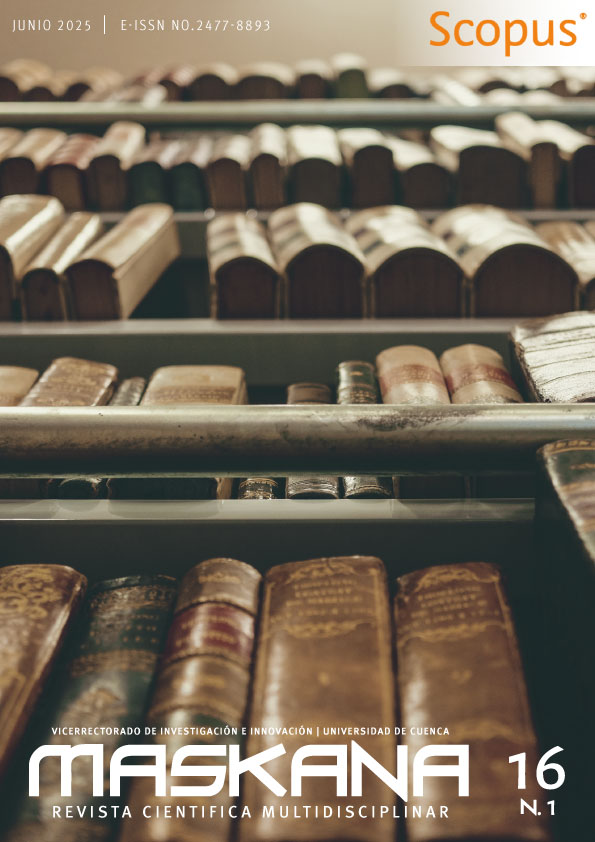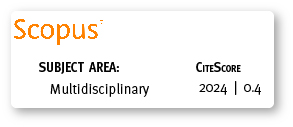El Método de Proyectos en Educación Infantil y su producción científica: una revisión sistemática
DOI:
https://doi.org/10.18537/mskn.16.01.05Palabras clave:
proyectos, método de proyectos, educación infantil, revisión sistemática, metodología PRISMAResumen
El Método de Proyectos (ABP) ha emergido como una estrategia pedagógica clave en la Educación Infantil. Este artículo realiza una revisión sistemática de 31 estudios seleccionados para analizar la trayectoria y el estado actual de la investigación sobre el ABP en España, publicados entre 2020 y 2024. Utilizando la metodología PRISMA, se identificaron, seleccionaron y sintetizaron investigaciones relevantes extraídas de bases de datos académicas indexadas en JCR como ERIC, Google Scholar, Dialnet, Redalyc y Scielo. Los hallazgos reflejan un aumento sostenido en la aplicación del ABP en Educación Infantil, subrayando su impacto positivo en el desarrollo de competencias clave como la creatividad, el pensamiento crítico y el trabajo en equipo. Además, se observa una diversidad en la implementación del ABP, incluyendo enfoques interdisciplinarios y tecnológicos, lo que evidencia su potencial para mejorar la práctica educativa en distintos contextos y escenarios.
Descargas
Métricas
Citas
Aksela, M., y Haatainen, O. (2019). Project-based learning (PBL) in practise: Active teachers' views of its' advantages and challenges. Integrated Education for the Real World. https://www.researchgate.net/profile/Outi-Haatainen/publication/333868087
Aljabreen, H. (2020). Montessori, Waldorf, and Reggio Emilia: a comparative analysis of alternative models of early childhood education. International Journal of Early Childhood, 52(3), 337-353. https://doi.org/10.1007/s13158-020-00277-1
Apaza Canaza, F., Cavero Pacheco, S. J., y Travieso Valdés, D. (2022). Aprendizaje Basado en Proyectos: su influencia en los resultados del estudiante. Varona. Revista Científico Metodológica, (75). http://scielo.sld.cu/scielo.php?pid=S1992-82382022000200004&script=sci_arttext
Arantes-Do Amaral, J. (2021). Using project-based learning to teach project-based learning: lessons learned. Pro-Posições, 32, 1-21. https://doi.org/10.1590/1980-6248-2018-0135EN
Barrera Arcaya, F., Venegas-Muggli, J. I., y Ibacache Plaza, L. (2022). El efecto del Aprendizaje Basado en Proyectos en el rendimiento académico de los estudiantes. Revista de estudios y experiencias en educación, 21(46), 277-291. http://dx.doi.org/10.21703/0718-5162.v21.n46.2022.015
Bell, S. (2010). Project-based learning for the 21st century: Skills for the future. The Clearing House: A Journal of Educational Strategies, Issues and Ideas, 83(2), 39-43. https://doi.org/10.1080/00098650903505415
Beneke, S., y Ostrosky, M. M. (2009). Teachers' Views of the Efficacy of Incorporating the Project Approach into Classroom Practice with Diverse Learners. Early Childhood Research & Practice, 11(1), n1. https://files.eric.ed.gov/fulltext/EJ848843.pdf
Muzás, M. D., y Blanchard, M. (2020). Cómo trabajar con proyectos de aprendizaje en educación infantil (Vol. 90). Narcea Ediciones.
Blumenfeld, P. C., Soloway, E., Marx, R. W., Krajcik, J. S., Guzdial, M., y Palincsar, A. (1991). Motivating Project-Based Learning: Sustaining the Doing, Supporting the Learning. Educational Psychologist, 26(3-4), 369-398. https://doi.org/10.1080/00461520.1991.9653139
Botella Nicolás, A. M., y Ramos Ramos, P. (2019). Investigación-acción y aprendizaje basado en proyectos. Una revisión bibliográfica. Perfiles educativos, 41(163), 127-141. https://www.scielo.org.mx/scielo.php?pid=S0185-26982019000100127&script=sci_arttext
Cascales Martínez, A. y Carrillo-García, M. E. (2018). Aprendizaje basado en proyectos en educación infantil: cambio pedagógico y social. Revista Iberoamericana de educación, 76, 79-98. https://doi.org/10.35362/rie7602861
Cascales Martínez, A., Carrillo García, M., y Redondo Rocamora, A. M. (2017). ABP y tecnología en educación infantil. Pixel-Bit. Revista de Medios y Educación, 50, 201-210. http://hdl.handle.net/11441/52196
Cascales Martínez, A., Carrillo García, M., y Redondo Rocamora, A. (2020). Innovación educativa y ABP en educación infantil. Congreso Internacional de Investigación e Innovación en Educación Infantil y Primaria. https://digitum.um.es/digitum/bitstream/10201/87058/1
Chen, C. H., y Yang, Y. C. (2019). Revisiting the effects of project-based learning on students’ academic achievement: A meta-analysis investigating moderators. Educational Research Review, 26, 71-81. https://doi.org/10.1016/j.edurev.2018.11.001
Clark, A. M. (2006). Changing classroom practice to include the project approach. Early Childhood Research & Practice, 8(2), n2. https://eric.ed.gov/?id=EJ1084959
Clavijo, R., López, C., Cedillo, C., Mora, C., y Ortiz, W. (2016). Actitudes docentes hacia la educación inclusiva en Cuenca. Maskana, 7(1), 13-22. https://doi.org/10.18537/mskn.07.01.02
Condliffe, B. (2017). Project-Based Learning: A Literature Review. Working Paper. MDRC. https://eric.ed.gov/?id=ED578933
Díaz Tenza, J. P. (2020). Más allá del ABP. Un análisis práctico y aplicado del aprendizaje basado en proyectos desde infantil hasta la enseñanza universitaria. Hacia una nueva escuela). Código de registro en Safe Creative: 2003063245409.
De Santiago, O. (2020). La educación en tiempos de la pandemia de COVID-19. CEPAL-UNESCO.
Dewey, J. (1938). The philosophy of the arts. John Dewey: The Later Works, 13(357-368).
Domènech-Casal, J. (2018). Aprendizaje Basado en Proyectos en el marco STEM: componentes didácticas para la Competencia Científica. Ápice. Revista de Educación Científica, 21(2), 29-42. http://hdl.handle.net/2183/21834
Engel, A., y Coll, C. (2022). Entornos híbridos de enseñanza y aprendizaje para promover la personalización del aprendizaje. RIED-Revista Iberoamericana de Educación a Distancia, 25(1), 225-242. https://doi.org/10.5944/ried.25.1.31489
Fernández-Cruz, M., y Fernández-Díaz, M. J. (2016). Competencias para ser un buen docente en el siglo XXI: Una revisión de la literatura internacional. Revista de Educación a Distancia, 16(1), 12-35.
Feyen, J. (2020). ¿Logrará la COVID-19 acelerar la transición del aprendizaje pasivo a la educación activa? Maskana, 11(1), 1-4.
García Andrade, A. (2019). Neurociencia de las emociones: la sociedad vista desde el individuo. Una aproximación a la vinculación sociología-neurociencia. Sociológica (México), 34(96), 39-71.
Hira, A., y Anderson, E. (2021). Motivating online learning through project-based learning during the 2020 COVID-19 pandemic. IAFOR Journal of Education, 9(2), 93-110. https://doi.org/10.22492/ije.9.2.06
Holm, M. (2011). Project-based instruction: A review of the literature on effectiveness in prekindergarten. River academic journal, 7(2), 1-13.
Hutton, B., Salanti, G., Caldwell, D. M., Chaimani, A., Schmid, C. H., Cameron, C. y Moher, D. (2015). The PRISMA extension statement for reporting of systematic reviews incorporating network meta-analyses of health care interventions: checklist and explanations. Annals of internal medicine, 162(11), 777-784.
Jane, M. (1998). The Project Approach: A different way to plan curriculum. Young Children, 53(4), 55-59.
Irure, A. R., y Belletich, O. (2015). El método de aprendizaje basado en proyectos (ABP) en contextos educativos rurales y socialmente desfavorecidos de la educación infantil. Perspectiva Educacional, Formación de Profesores, 54(1), 90-109. https://www.redalyc.org/articulo.oa?id=333333042007
Kokotsaki, D., Menzies, V., y Wiggins, A. (2016). Project-based learning: A review of the literature. Improving schools, 19(3), 267-277. https://doi.org/10.1177/1365480216659733
Kołodziejski, M., y Przybysz-Zaremba, M. (2017). Project method in educational practice. University Review, 11(4), 26-32.
Krajcik, J. S., y Blumenfeld, P. C. (2006). Project-based learning. En R. K. Sawyer (Ed.), The Cambridge handbook of the learning sciences (pp. 317-333). Cambridge University Press.
Lee, Y. J. (2022). Supporting Equitable Participation Through Project-Based STEM Learning at the Elementary Level.
Li, Y., y Schoenfeld, A. H. (2019). Problematizing teaching and learning mathematics as “given” in STEM education. International journal of STEM education, 6(1), 1-13. https://doi.org/10.1186/s40594-019-0197-9
Lucenko, G., Hrechanyk, N., Gavrilenko, T., y Lutsenko, O. (2023). Using the project method as a means of developing the creative potential of primary school children in Ukraine. Education 3-13, 51(7), 1185-1194. https://doi.org/10.1080/03004279.2022.2053182
Martínez Hernando, P. (2021). Metodologías activas en educación infantil: Un enfoque basado en proyectos. Universidad Complutense de Madrid. https://uvadoc.uva.es/handle/10324/49036
Moher, D., Liberati, A., Tetzlaff, J., Altman, D. G., y The PRISMA Group. (2009). Preferred reporting items for systematic reviews and meta-analyses: The PRISMA statement. PLOS Medicine, 6(7), e1000097. https://doi.org/10.7326/0003-4819-151-4-200908180-00135
Orozco Sosa, G., Lizárraga Caro, F., y Flores-Verduzco, G. R. (2023). Desarrollo de los sistemas híbridos en el periodo pospandemia. http://ru.iiec.unam.mx/6169/
Osorio Pérez, C. (2024). Aprendizaje activo en la primera infancia: Evaluación de proyectos en el aula. Journal of Early Childhood Education, 20(3), 201-215.
Posso Pacheco, R. J., Cóndor Chicaiza, M. G., Mora Guerrero, L. M., y Segundo Leonidas, R. M. (2023). Aprendizaje basado en retos: una mirada desde la educación superior. Podium. Revista de Ciencia y Tecnología en la Cultura Física, 18(2).
Ramey, C. T., y Ramey, S. L. (2023). Early childhood education that promotes lifelong learning, health, and social well-being: The Abecedarian Project and its replications. American Educational Research Journal, 60(1), 21-38. https://hdl.handle.net/10919/116784
Rocha Espinoza, J. J. (2020). Metodologías activas, la clave para el cambio de la escuela y su aplicación en épocas de pandemia. INNOVA Research Journal, 5(3), 2. https://dialnet.unirioja.es/servlet/articulo?codigo=7878934
Ruiz Hidalgo, D., y Ortega-Sánchez, D. (2022). El aprendizaje basado en proyectos: una revisión sistemática de la literatura (2015-2022). HUMAN REVIEW. International Humanities Review/Revista Internacional de Humanidades, 14(6), 1-14.
Sánchez Garrido, A. M. (2021). El Aprendizaje Basado en Proyectos (ABP) Como Metodología en Educación Infantil (Bachelor's thesis). http://hdl.handle.net/20.500.12466/2091
Santillán-Aguirre, P., Jaramillo-Moyano, E., Hernández-Andrade, L., y Santos-Poveda, R. (2023). ABP and STEAM as Active Learning Methodologies El. ESPOCH Congresses: The Ecuadorian Journal of STEAM, 764-779. 10.18502/espoch.v3i1.14485
Sarceda Gorgoso, M. C., Seijas Barrera, S. M., Fernández Román, V. F., y Seoane, D. F. (2016). El trabajo por proyectos en Educación Infantil: aproximación teórica y práctica. RELADEI. Revista latinoamericana de educación infantil, 159-176. http://46.4.244.235/index.php/reladei/article/view/172
Suárez, A. A. T., Caleris, y. M., y Biber, P. A. (2023). Aprendizaje híbrido y recursos digitales en el contexto de pandemia.
Torrego Egido, L., y Martínez Scott, S. (2018). Sentido del método de proyectos en una maestra militante en los Movimientos de Renovación Pedagógica. Revista Electrónica Interuniversitaria de Formación del Profesorado, 21(2), 1-12. https://doi.org/10.6018/reifop.21.2.323181
Vasconcelos, T. (2007). Using the Project Approach in a Teacher Education Practicum. Early Childhood Research and Practice, 9(2).
Wulandani, A., Darmawan, A., y Santoso, H. (2022). STEAM integration in project-based learning for early childhood education. International Journal of Education and Development using ICT, 18(2), 45-61.
Descargas
Publicado
Cómo citar
Número
Sección
Licencia
Derechos de autor 2025 Paula Martinez Enriquez

Esta obra está bajo una licencia internacional Creative Commons Atribución-NoComercial-CompartirIgual 4.0.
Copyright © Autors. Creative Commons Attribution 4.0 License para cualquier artículo enviado a partir del 6 de junio de 2017. Para los manuscritos presentados anteriormente, se utilizó la licencia CC BY 3.0.
![]()
Usted es libre de:
 |
Compartir — compartir y redistribuir el material publicado en cualquier medio o formato. |
 |
Adaptar — combinar, transformar y construir sobre el material para cualquier propósito, incluso comercialmente. |
Bajo las siguientes condiciones:
 |
Atribución — Debe otorgar el crédito correspondiente, proporcionar un enlace a la licencia e indicar si se realizaron cambios. Puede hacerlo de cualquier manera razonable, pero de ninguna manera que sugiera que el licenciador lo respalda a usted o a su uso. |
| Sin restricciones adicionales: no puede aplicar términos legales o medidas tecnológicas que restrinjan legalmente a otros a hacer cualquier cosa que permita la licencia. |
Mayor información sobre este acuerdo de autoría y licencia, transferencia de derechos o solicitudes de reproducción, pueden ser consultados en este enlace.









